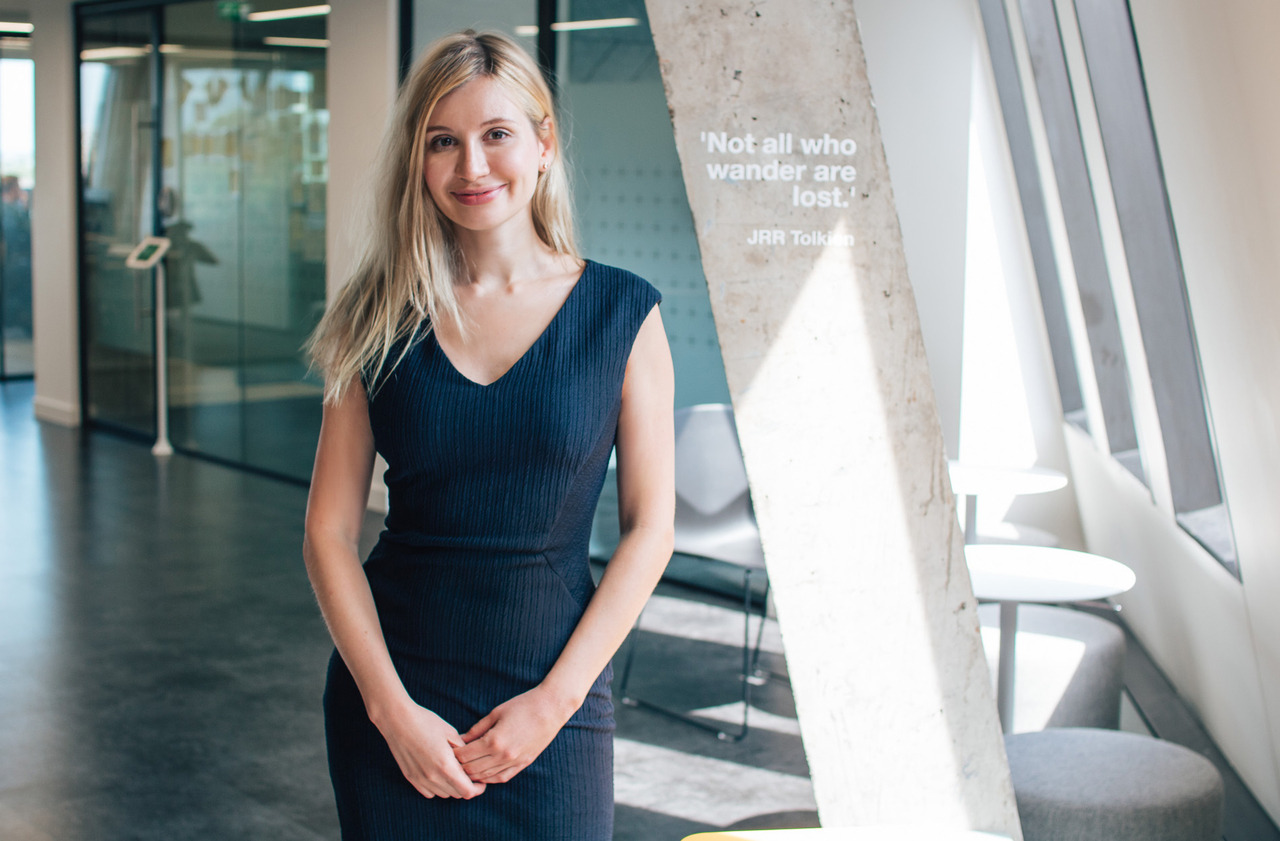Katia Lang, CEO of The Fintech Times
26 May 2021

What were you doing before attending the University of St.Gallen MBA?
I used to be in the arts. I was an artist, a painter, and I also studied graphic design. For a while I was doing a lot of publishing. My biggest thing at the time was this big art magazine I was producing for a contemporary art museum in St. Petersburg. And at some point I left that, and I was travelling for a few months, and I was trying to figure out: What else was there for me? That’s when I started thinking, maybe I should get some actual business skills, since by the time I was 23 I had started and failed two-and-a-half companies (laughs). I thought, maybe I should get a proper business education and this will help.
So you had a background in publishing before you started The Fintech Times?
Yes, I did. My father was in the book publishing business, and I kind of grew up watching that, observing that. So, creating books and print publications has always been my passion.
So when you are having this early part of your career, making mistakes, learning and growing, what were the key skills that you think you had? And what were the ones that were missing, that you thought, ‘OK, maybe I should go do an MBA to work on these?’
I think my key skill, my one important skill in life, is that I’m just not afraid. I just go for it. If I have an idea tomorrow that I want to start, I’ll just go and do it. It’s just never been a problem for me. There’s always this being brave enough, and stupid enough, in a good way, that made me start something without thinking twice. It’s about seeing what you want, and then somehow going for it. This little gap between seeing what you want and actually getting there, this is what I got wrong most of the times, but it never stops me from trying.
What is it like being an artist and doing an MBA?
It was like a different planet. And this was one of the most important experiences in my life. You have to jump into this completely new world, and you have to push yourself really far out of your comfort zone. It made me a better person. I think the skill set you learn is really important. This is what helped me start The Fintech Times. With all my arts background, I would never have started a financial publication. I wouldn’t be able to understand what makes it tick.
What drives you into these businesses? How much do you have to talk yourself into it, or is it really like a frictionless, fearless thing?
Dealing with all the small day-to-day things, which are not part of this huge beautiful vision that I have, that is hard. This does require a lot of talking myself into. When one of your employees is leaving and it breaks your heart, but then you have to push through. All this day-to-day struggle of running a business, or growing it, that is hard. Having a vision, starting a new thing is not hard.
When you started The Fintech Times, did you write a business plan?
(Laughing) You need to have a business plan, you need to have a strategy, you need to have everything sorted out, everything thought through. None of that happened. I moved to the UK after St. Gallen. I thought it was culturally very fitting for me. Because I’m mixed race, mixed culture, mixed everything. So, I end up in London, which is the most international, most multicultural place I could imagine. I think being an entrepreneur was, like, my only option. I ended up on Google Campus, doing some freelancing, meeting people. It was full of entrepreneurs trying to start something, trying to build something. I started talking to all these incredible startup founders and I realized there was no one media outlet talking about all these wonderful people and their ideas.
Most media companies want to report a big fundraising, or an exit, but there’s nobody talking about early stage or angel stage?
No media cares about grassroots new ideas. What I was interested in was people and ideas. The founders, their personalities and how they came up with something, how they failed multiple times, pivoted, grew, got somewhere; these are interesting things for me.
Are these the types of stories you seek out?
Yeah, we do. We have quite a strict editorial team.
In starting a company, from your own experience, how do you prioritise team and culture and knowing the original idea might change?
Everyone I’ve ever spoken to about business, they’ve said the team is hardest part. I did not realise that until we grew to over four or five people. Anywhere below that, it’s kind of a group of mates doing things. That’s when real hiring and firing comes in, it’s hard. I had to say goodbye to a few very good people, purely on the basis of us changing strategy. That was tough, that was awful. Because I’m a very ‘people person.’ I could never run a business where everything is outsourced, everybody works from home. So, I think this is another little learning, that in your business plan, whatever it is, it needs to be built around the founder’s personality.
Who is the audience for The Fintech Times?
When we started, we thought it would be read by the Fintech sector. It kind of is, but only around 30% of our readers are Fintech companies and Fintech company founders. Most of our readership is mid-to-senior management in corporates who need to be getting this expertise and this understanding of what Fintech is. What it does or how it’s changing the industry, how it’s changing the jobs they might do. Also students. They want to understand this emerging, big thing.
You mentioned earlier that traditional papers are maybe not covering the same stories as you are, or they’re not covering the same angle. Can you elaborate on any competition that is creeping into that gap?
I would say there are a lot of online resources which these days try to cover Fintech; Including Forbes, including Financial Times these days. A lot of big media companies are trying to create reports on various sectors of Fintech, which I think we do better. We’re better because we know them all [the companies], we’re sitting in the same office space with them every day, we watch them do their stuff, we talk to them. It’s about this power of being part of the startup culture, rather than trying to be an outsider reporting on it.
How do you source your stories? What are some of the channels or ways that stories come to you that perhaps are not making it to some of the other publications?
We get our stories from personal networks; From going to conferences, talking to people, participating in roundtables. I speak at quite a lot of conferences these days, that gets us together with the actual community to realise the life of it. It should come from the community. Because otherwise you’re just pushing someone’s agenda, which is just not interesting.
Did you get outside funding, or have you financed yourself and bootstrapped?
We started with £1,000 between the two founders, nothing else, to print our first magazine and we made money on the very first edition. So, we produced the first edition of Disrupts Magazine, at the time it was called. It was a different thing, because it was not just Fintech focused it was rather startup focused. It immediately got quite a lot of traction and we got quality advertisers straight away. We kept making some money on it until the first angel investor actually met us in a coffee queue somewhere in a café in the City. He just saw us with this magazine, heard us talking about it, and was like, ‘oh, what’s that?’ He invested something around £15,000, which was awesome and allowed us to do a bit more. So funding is important. Later down the line we got another £50k in, then another £100k to start The Fintech Times. That was a bit of a journey for us, we stopped and started new things quite a lot until we figured out what works. Without investment we would not be able to ever do this. But then there’s another danger here. If you just keep doing that, without a vision, without knowing where you’re going, you become one of these lifestyle businesses. You kind of cover your expenses. It’s kind of all fine. But you will never get to this big, nice picture you have in your mind when you start the business.
So what is the vision now?
Yes, that’s my favourite thing (laughing). So, I do think there’s a space in the global media world for an outlet that is 100% focused on Fintech. Because Finance becomes Fintech. So eventually The Fintech Times becomes the new Financial Times. This is how we see it. I know there is always a danger of a big news outlet launching the Fintech side of it, but they will never have the startup connections, the kind of network that we do at the moment. So that’s important for us not to lose it, and to keep moving.
Who do you take inspiration from? Are there other businesses outside of publishing, or outside of the media landscape entirely, that you look to and are inspired by how they run themselves or how they’ve grown?
I think in a funny way we don’t really get inspired by media companies, because we are trying to be different. That’s the point. I think we do get inspired by startups. The way they do things. The way they experiment. How they run their teams, being very agile, connected, flexible. I think in many ways we get inspired by company founders on a personal level.
What future plans are you able to share?
We are now expanding to the US. We already have a couple of people in San Francisco, but we want to have a more significant presence there. We see online that 30% of our traffic is coming from the US already, and we have done absolutely nothing to achieve that. We get calls from people in New York saying, ‘We want to advertise with you.’ When I ask why, they say, ‘Because you’re on the top of rankings of Fintech influencers for media.’ So we want to capitalize on that. We are also launching The Fintech Times in Japanese, with a team fully based in Tokyo. It was completely inbound. There was a Japanese gentleman who approached me at a conference. He said he was looking for an existing, established Fintech media brand to launch in Japan in Japanese. His background was also in media and he knew there was a gap in the market in Japan. He approached us because he liked what we we are doing, that’s really wonderful to get on people’s radar, like that. We have some more upcoming exciting news to announce, so watch this space.

